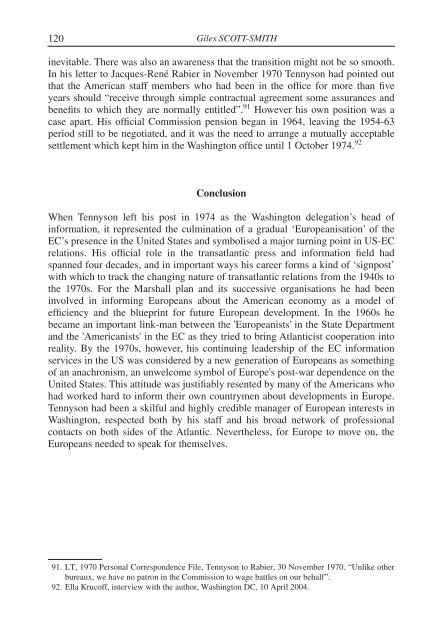2008, Volume 14, N°2 - Centre d'études et de recherches ...
2008, Volume 14, N°2 - Centre d'études et de recherches ...
2008, Volume 14, N°2 - Centre d'études et de recherches ...
Create successful ePaper yourself
Turn your PDF publications into a flip-book with our unique Google optimized e-Paper software.
120<br />
Giles SCOTT-SMITH<br />
inevitable. There was also an awareness that the transition might not be so smooth.<br />
In his l<strong>et</strong>ter to Jacques-René Rabier in November 1970 Tennyson had pointed out<br />
that the American staff members who had been in the office for more than five<br />
years should “receive through simple contractual agreement some assurances and<br />
benefits to which they are normally entitled”. 91 However his own position was a<br />
case apart. His official Commission pension began in 1964, leaving the 1954-63<br />
period still to be negotiated, and it was the need to arrange a mutually acceptable<br />
s<strong>et</strong>tlement which kept him in the Washington office until 1 October 1974. 92<br />
Conclusion<br />
When Tennyson left his post in 1974 as the Washington <strong>de</strong>legation’s head of<br />
information, it represented the culmination of a gradual ‘Europeanisation’ of the<br />
EC’s presence in the United States and symbolised a major turning point in US-EC<br />
relations. His official role in the transatlantic press and information field had<br />
spanned four <strong>de</strong>ca<strong>de</strong>s, and in important ways his career forms a kind of ‘signpost’<br />
with which to track the changing nature of transatlantic relations from the 1940s to<br />
the 1970s. For the Marshall plan and its successive organisations he had been<br />
involved in informing Europeans about the American economy as a mo<strong>de</strong>l of<br />
efficiency and the blueprint for future European <strong>de</strong>velopment. In the 1960s he<br />
became an important link-man b<strong>et</strong>ween the 'Europeanists' in the State Department<br />
and the 'Americanists' in the EC as they tried to bring Atlanticist cooperation into<br />
reality. By the 1970s, however, his continuing lea<strong>de</strong>rship of the EC information<br />
services in the US was consi<strong>de</strong>red by a new generation of Europeans as som<strong>et</strong>hing<br />
of an anachronism, an unwelcome symbol of Europe's post-war <strong>de</strong>pen<strong>de</strong>nce on the<br />
United States. This attitu<strong>de</strong> was justifiably resented by many of the Americans who<br />
had worked hard to inform their own countrymen about <strong>de</strong>velopments in Europe.<br />
Tennyson had been a skilful and highly credible manager of European interests in<br />
Washington, respected both by his staff and his broad n<strong>et</strong>work of professional<br />
contacts on both si<strong>de</strong>s of the Atlantic. Nevertheless, for Europe to move on, the<br />
Europeans nee<strong>de</strong>d to speak for themselves.<br />
91. LT, 1970 Personal Correspon<strong>de</strong>nce File, Tennyson to Rabier, 30 November 1970. “Unlike other<br />
bureaux, we have no patron in the Commission to wage battles on our behalf”.<br />
92. Ella Krucoff, interview with the author, Washington DC, 10 April 2004.

















